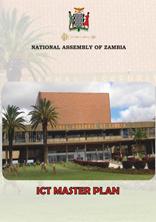National Assembly of Zambia - ICT Master Plan

Information and Communication Technologies (ICTs) have become an important strategic tool in both developed and developing countries for promoting competitiveness and stimulating economic growth in addition to lowering delivery costs for public services in all sectors. The economic and social development mandate of the United Nations Economic Commission for Africa (UNECA) has enabled it to play a primary role in facilitating the development of international and regional policies and programmes to ensure Africa’s full and active participation as a partner in developing the global knowledge economy. ICTs play an important role in facilitating the attainment of development goals and in response to the challenges of the information age. In recognition of this, UNECA launched the African Information Society Initiative (AISI) in May 1996 as a common vision, not only to bridge the digital divide between Africa and the rest of the world, but also to create opportunities for Africans to develop digital capacities effectively and speed the continent’s entry into a global economy propelled by information and knowledge.
Since the launch of AISI, UNECA has been supporting Member States to develop National Information and Communication Infrastructure (NICI) policies, plans and strategies. These provide the framework within which ICTs are mainstreamed into the national planning process to facilitate the achievement of national development priorities and objectives. UNECA has also been supporting Regional Economic Communities (RECs) and national and regional institutions to develop e-strategies to support their core business. E-parliament is one of these areas of intervention and it is through partnerships with UNECA that national parliaments can benefit from the principles and programmes of AISI.